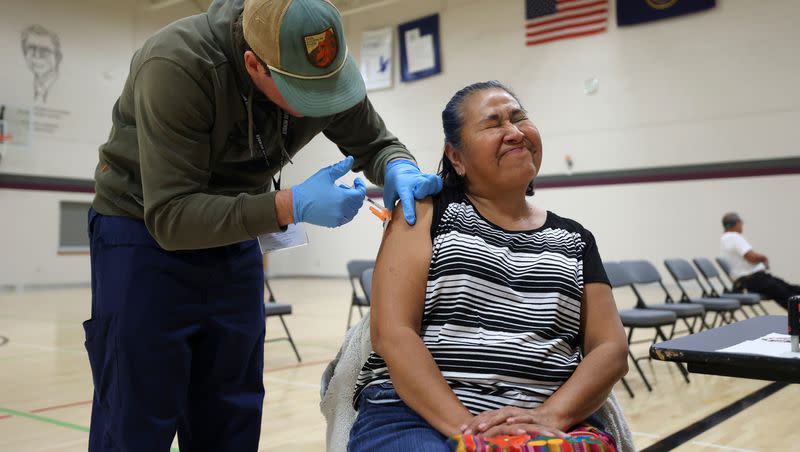What you need to know about the timing of COVID-19, flu shots this year

- Oops!Something went wrong.Please try again later.
Many Utahns routinely get an annual flu shot every fall. But now that the federal government has given the go-ahead for everyone six months and older to get the newly updated COVID-19 vaccine, how should the shots be timed?
The question is complicated by problems with the rollout of the new COVID-19 shots. Approved in mid-September, they’re still difficult to find in Utah and around the country, and may not yet be covered by some insurance plans as required.
Intermountain Health, the region’s largest health care provider, hasn’t even been able to order the new COVID-19 vaccine, updated from last year’s booster dose to target more recent versions of the virus.
Related
“It’s still not available. We know there’s some out in the community, but our sources don’t have it available for us to order yet,” said Dr. Tamara Sheffield, medical director of preventive medicine for Intermountain Health.
“We’re looking minute by minute,” Sheffield said, with the hope of getting the new COVID-19 vaccine by the first or second week of October, so Utahns can start rolling up their sleeves for the shots.
Here’s why experts want you to get a COVID-19 shot now
“The advice actually for COVID vaccine is to get it immediately. And the reason being, is we have that virus circulating in our community. So if you want immediate protection from what is circulating, that is exactly what’s in the vaccine,” she said.
“Get it as soon as it becomes available,” Sheffield said. “I would say, don’t delay.”
The immunization director for the Utah Department of Health and Human Services, Rich Lakin, agreed, citing the climb in COVID-19 indicators, a trend that started in the summer.
“My recommendation is yes, get your COVID as soon as you can because it’s already circulating,” he said, acknowledging there are Utahns who don’t feel they need to be vaccinated against the virus.
“I think people are okay with treating this like the cold, ‘Oh, I’ve gotten COVID, I’m sick, but I’ll get better.’ They’re not seeing the side that hospitalizations have been slightly increased,” Lakin said, adding the virus is currently spreading among his St. George neighbors.
“I’m just seeing all around my neighborhood, people getting COVID and they’re sick,” he said. “The whole idea behind a vaccine is to reduce the severity of the illness, not to prevent it. So why not get the vaccine and then when you do get COVID, you won’t be as sick.”
Can you wait to get a flu shot?
While a flu shot can be given at the same time as the COVID-19 vaccine, influenza hasn’t really hit yet. According to Intermountain Health’s “Germ Watch” website, seasonal flu activity is either non-existent or low throughout most of the state.
Last year, flu cases began increasing around the start of November and peaked in early January, although the season lasted longer.
“Personally, I think October is ideal,” Lakin said. “If you can get it in like mid-October, that would be perfect because protection wanes over a season and the best time to have your highest protection is when we all start to mingle,” especially during the holidays.
Related
That’s the approach a top U.S. Food and Drug Administration official said he’s taking, even though the director of the Centers for Disease Control and Prevention, Dr. Mandy Cohen, posted on social media on Sept. 6 that she’d gotten her flu shot,
Dr. Peter Marks, director of the FDA’s Center for Biologics Evaluation and Research, said recently he planned to space out his vaccinations, getting the COVID shot right away and waiting until early October for the flu shot, CBS News reported late last week.
The protection from a flu shot “has a little bit of a shorter life than we might like, in some ways it’s a little like the COVID vaccines,” Marks said, the reasoning behind not getting the flu vaccine too early in the season, before infection becomes a threat.
The FDA official noted with “a lot of COVID around, (it’s a) great time to go get” the new shot.
Why you may want both shots at the same time
But Marks also pointed out that while waiting between shots “could minimize the chance of interactions, and minimize confusing side effects from one with another,” that might not work for everyone.
Lakin also said he didn’t want to discourage anyone from going ahead and getting a flu shot now, too, if that’s easier.
“If it’s convenient, just get it,” Lakin said.
Related
Sheffield recommended anytime during the month of October for a flu shot, a balance “between getting it before the flu season starts but not too early so that your immunity wanes.”
However, with the COVID-19 shots not expected to be widely available until next month, she suggested people might as well plan on getting both the influenza and COVID-19 vaccines at the same time.
“That’s the best message around this,” Sheffield said, rather than trying to time when to receive the shots. “We’re at that point now where ... when it’s available, get your influenza and COVID vaccine.”

